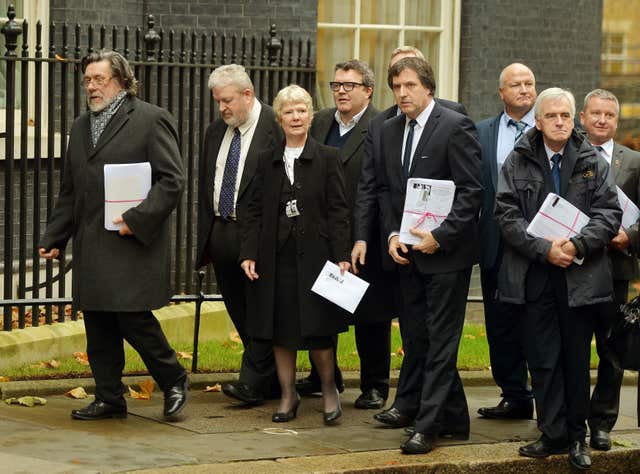Ricky Tomlinson calls for inquiry into ‘secret state’ role in Shrewsbury 24 case
The Royle Family star said the ‘dirty tactics’ used ‘to criminalise the Shrewsbury 24’ should be examined at a public inquiry.

Ricky Tomlinson has called for a public inquiry into the role of the “secret state” in the prosecutions of the Shrewsbury 24 as their bid to overturn their convictions concluded at the Court of Appeal.
The Royle Family star is one of 14 members of the so-called Shrewsbury 24, two dozen trade unionists who picketed in Shrewsbury during the 1972 national builders’ strike, who argue that their convictions are unsafe.
They were charged with offences including unlawful assembly, conspiracy to intimidate and affray and faced three “highly politicised trials” in 1973 and 1974, at which 22 of the 24 were convicted.
At a hearing in London which started on Wednesday, Court of Appeal judges were told that the “higher echelons of the state” were involved in the making of a “deeply prejudicial” programme broadcast during the first trial in 1973.
A “covert Foreign Office agency” known as the Information Research Department (IRD) provided “considerable assistance” in making Red Under The Bed, which was broadcast at the conclusion of the prosecution case in the first trial, the court was told.
Danny Friedman QC, representing 12 of the pickets, said in written submissions that the head of the IRD had told a senior Foreign Office official that “we had a discreet but considerable hand in the programme”.
He said the IRD “had consulted the Security Service”, also known as MI5, about the programme, which was also praised by then prime minister Edward Heath, who said: “We want as much as possible of this.”
Mr Friedman told the court: “It is obvious … a covert executive agency played a part in deliberately propagandising against the core subject matter of the proceedings.”
He added: “It is clear now that the higher echelons of the state bore responsibility for deliberate covert involvement in the production of the programme.
“In all the circumstances, the approach taken to broadcasting this programme has rendered the convictions unsafe.”
Piers Marquis, representing Mr Tomlinson and another picket, Arthur Murray, told the court that “at least three branches of Government, the IRD, as part of the Foreign and Commonwealth Office, the Department of Employment and the Security Service” provided material for the programme.

In a statement, Mr Tomlinson, who was sentenced to two years in jail for conspiracy to intimidate and affray, said: “After hearing the evidence today, it should alarm every trade unionist, every socialist and every campaigner.
“Indeed, every person in the UK must question how the secret state has used subterfuge, a secret strategy and dirty tactics to criminalise the Shrewsbury 24, who were only guilty of striking for better pay and for better health and safety at work.”
He added: “There really does need to be a public inquiry into what has happened.”
Paul Heron, Mr Tomlinson and Mr Murray’s solicitor, said: “The arguments presented in this court paint a damning picture of the secret state and its manoeuvres against the national builders’ strike and more particularly the Shrewsbury 24.
“It has been demonstrated today that the state was active in criminalising those picketing for better pay, health and safety.
“Such disturbing findings must be echoed and condemned throughout our country so that similar state efforts may not be deployed again in these times of austerity and hardship when struggles emerge.
“What occurred in the 1970s must not be allowed to occur today.”
Mr Heron added: “There needs to be a statutory public inquiry into the events of Shrewsbury and the role of state agencies specifically, but such an inquiry must look at the issue of blacklisting in the industry in general.”
John Price QC, representing the CPS, argued in written submissions the appellants’ “fresh evidence” on the making of Red Under The Bed was “wholly irrelevant”.
He said the new evidence “does not and is not alleged to show any link at all between the scheduling of the broadcast and the trial”.
Mr Price added that the judge in the first trial “had already directed the jury in strong terms that political considerations of any kind were irrelevant”.
At the conclusion of the hearing on Thursday afternoon, Lord Justice Fulford, sitting with Mr Justice Andrew Baker and Mr Justice Goose, said the court would give its judgment at a later date.




